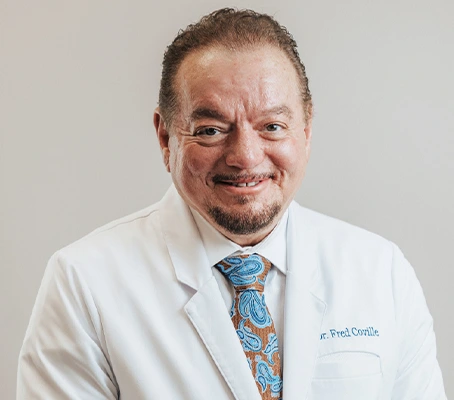- Select Language ▼
Cornerstone Plastic Surgery has partnered with Rejuvenessence to bring you an expert-led Weight Loss Program. Learn More on our partner’s website!
During an otoplasty, the ears are surgically repositioned or reshaped to give a more regular and symmetric appearance. Most otoplasties make prominent ears lie more closely against the head or reduce the size of overly large ears.
Most patients are children aged between 4 and 14, but adults can also have ear surgery. What can and should be done in your or your child’s case will depend on a consultation with Dr. Coville. However, the following introductory paragraphs will, we hope, be helpful.
Otoplasty to correct your ears’ shape, size, or position can tremendously benefit your confidence and emotional health. The best candidates for ear surgery are generally in good health and understand the potential results otoplasty can provide. Your consultation with Dr. Coville will include a thorough examination and measurement of your facial features and ears, discussion of your complete medical history and goals, and he will happily answer any questions you may have.

The operation for prominent ear correction takes approximately 1.5-2 hours and is generally performed under local anesthetic with some mild sedation for adults. Children usually receive a general anesthetic, but many parents opt for local anesthesia as well.
Dr. Coville first makes a small incision in the back of the ear to expose the cartilage for sculpting and repositioning, including closer to the side of the head if that is your goal. Dr. Coville uses durable stitches to manipulate the cartilage into an aesthetically pleasing form and help maintain the new shape. He may need to remove some of the cartilage to create a more natural-looking fold. Most ear surgery leaves only a faint scar, inconspicuously hidden in the natural crease where the ear meets the head, which fades with time. Dr. Coville most often performs the surgery on both ears for better balance, even when only one ear appears to protrude.
When you choose a qualified, experienced surgeon, complications are infrequent and usually minor. Nevertheless, as with any operation, there are risks associated with surgery. With this procedure, a small percentage of patients may develop a blood clot under the ear’s skin. It may dissolve naturally or be drawn out with a needle. Occasionally patients develop an infection in the cartilage, which can cause some scarring. Antibiotics can usually clear up any such infection. Rarely is further surgery required to drain the infected area.
Besides protruding ears, there are a variety of other ear problems that otoplasty can help. These include:
Surgery can also improve large or stretched earlobes or lobes with large creases and wrinkles. Dr. Coville frequently repairs torn earlobes caused by earrings right in his office. Another very popular procedure is the repair of earlobe holes caused by gauges. Dr. Coville has become well known for restoring ears to their normal, pre-gauge appearance with a procedure he performs right in the office under local anesthesia.
At Cornerstone Plastic Surgery in Linwood and Toms River, NJ, we can even build new ears for those born without them or who’ve lost them through injury. Ask Dr. Coville about the effectiveness of surgery for your specific case.
After the operation, you will have a head bandage. It will not feel tight and should remain in place, day and night, for one week. It is worth buying a sports headband before the surgery, so you can wear it after your bandages come off. The headband should be comfortable and not too tight.
Patients are usually up and around within a few hours of surgery. We will wrap your head in a bulky bandage immediately following surgery to promote the best molding and healing. Although your ears may throb or ache a little for a few days, Dr. Coville will prescribe medication to relieve any discomfort. Within a few days, Dr. Coville will replace the bulky bandages with a lighter head dressing similar to a headband. Be sure to follow his directions for wearing this dressing, especially at night. The stitches are usually removed or will dissolve in about a week. You should avoid any activity that could bend the ear for a month or so. Patients can usually go back to work or school about 5 days after surgery.
Rest assured that we will guide you through every step of the process. Post-operative care is an essential part of Dr. Coville’s work at Cornerstone Plastic Surgery in Atlantic County, New Jersey.
Most patients, young and old alike, are thrilled with the results of ear surgery. Keep in mind that the goal is improvement, not perfection. Don’t expect both ears to match perfectly. Perfect symmetry is both unlikely and unnatural. Once you’ve discussed the procedure and your expectations with Dr. Coville thoroughly before the operation, chances are, you’ll be pleased with the result. Your ears will be more symmetrical, protrude less, and be refined in shape, causing an upswing in confidence.
Written By: Dr. Frederick Coville
Frederick A. Coville, M.D., Cornerstone Plastic Surgery’s Owner and Medical Director
Frederick A. Coville, M.D., Cornerstone Plastic Surgery’s Owner and Medical Director, has been an Aesthetic and Reconstructive Plastic Surgeon for over 25 years. He firmly believes each of us possesses an inner “Foundational Beauty.”
As a student of beauty all his life, he calls upon his naturally artistic eye and God-given talents as a surgeon to deliver the results you demand. Dr. Fred likes to say, “It’s my job to help you find Your Beautiful!”
Request your consultation and let
us create a custom experience for you
